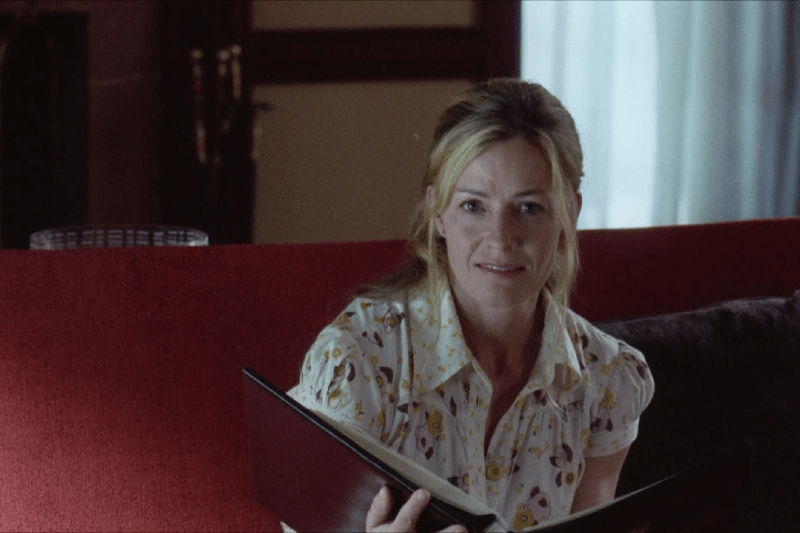The horror begins within.
A sense of the other. A lurking fear. A strange feeling that grows and grows until it finally explodes.
And suddenly you’re a mother.
Pregnancy has been a mainstay in horror films since at least Village of the Damned, when a town of English ladies all birthed spooky children with platinum hair. Rosemary’s Baby added Satanism to the mix, with an expectant Mia Farrow either starving herself or gobbling raw chicken livers. And then there was the killer infant of It’s Alive, a film which so disgusted its own studio they hastily withdrew it after its initial release and shelved it for three years.
Pregnancy horror is the original body horror, full of primal fears, whether they’re men’s nervousness about female power or women’s anxiety about loss of identity. Already outfitted with gruesome gore and cold technology, it’s ready for any genre, too. What is the entire sci-fi Alien franchise but the metaphor taken to its most loathsome conclusion, with a life-sucking parasite growing until it bursts free of its host and embarks on its own hungry, selfish rampage?
And yet almost all those films either focus on the months of expecting, or the little creature who comes afterward, a tiny 666 hidden under its baby-fine hair. What about the mother herself? What happens when Mom’s the monster? That’s not a subject many movies are willing to take on.
First Born, though, was different.
Perhaps that’s why it failed to find an audience. Written and directed by Isaac Webb in 2007, First Born went straight to video, despite decent production values and star Elisabeth Shue. Today, Rotten Tomatoes gives it an audience score of 19% and logs exactly one, lukewarm review; “A movie where anything could be happening,” complained the critic for DVDTalk, “and in the end, nothing is.” It’s mostly dropped out of sight since, although it hides on a few streaming services.
Yet First Born works. And what it delivers isn’t just edgy, but genuinely disturbing; while it stops occasionally to insert the obligatory horror-film clichés, its real horror is of a more slippery sort. This isn’t just a story about postpartum depression (or even postpartum psychosis). It’s about a woman’s loss of agency, of independence, of self. And while that story comes from a male writer (like this review), it’s not an exercise in mansplaining. It’s a film of empathy.
First Born begins with a dreamy credit sequence, as Elisabeth Shue — or, more likely, her dance double — strides across a stage en pointe and in silhouette, long legs propelling her with delicate grace. Her outfit — a body stocking, under a floor-length bolt of gauzy material — gives the impression of nakedness, making the scene look like a quieter, classier 007 opening. But the ghostly costume, mimicking both a wedding veil and a shroud, also hints at the film’s vision of marriage as loss of oneself.
We move quickly from there to backstage, and the sounds of Shue’s character — Laura — vomiting in a bathroom. Another story that links performance to eating orders, we assume. Check. Yet like the many conclusions the film will encourage us to jump to, it is absolutely wrong.
As Laura heads home on the subway, we get the first hints that this may be a horror film — Alejandro Martinez’s cinematography gives everything a sickly, sallow cast, and the train’s lights flicker fitfully, casting stroboscopic shadows. Looking down at the car, Laura sees a sad young woman with a baby — her face grim, her feet in cheap flip flops. Laura stares at her — with jealousy? Worry? Her expression is ambiguous, but it turns to anxiety when, the next time the lights come back on, the woman has vanished, leaving her baby behind.
Except, Laura discovers, it’s not a baby — just a doll wrapped in a blanket.
Oddly, Laura takes it home with her, stopping along the way to buy four different home pregnancy tests (an early sign of her blind, casual consumerism; throughout First Born, Laura will never buy one of something when she can buy an armload). Returning to her huge, cold, and all-white apartment (complete with its matching small, white dog) she takes a test, and confirms what her early bout of nausea hinted at: she’s expecting.
Her husband arrives home later, and when she tells him her good news, he’s genuinely pleased. But soon another side of him emerges.
Webb has been smart with his casting in First Born. Certainly, first of all, with getting Shue to star; admitted, she is, at 44, a little old for the part. But in films like The Trigger Effect, Molly, and, of course, Leaving Las Vegas, Shue always suggested a vulnerability that seemed ripe for exploitation. And casting Steven Mackintosh as Laura’s husband, Steven, is absolutely perfect. The safe choice would have been someone paternal, assertive, dominant; instead, Webb chose a slightly younger Englishman with a polite, even diffident manner. It throws us off, at first. Steven seems like a loving husband. He doesn’t seem like some self-involved sexist.
But, of course, he is.
Because once we meet the workaholic Steven, we realize exactly who’s been paying for that gorgeous white-on-white apartment they live in and what he thinks that’s bought him. Once he finds out about the new addition to the family, he immediately springs into action, planning out the next act in their lives. “It’s time to get out of this city just like we always wanted,” he declares. “You mean just like you always wanted,” Laura corrects quietly. But within seconds, he’s gotten Laura to “at least think” about trading Manhattan for the suburbs. By the next scene, she’s already meeting with a real estate agent. Alone, of course; Steven is too busy to actually go through the work of choosing a home. That’s a wife’s job. His job is to write the checks.
At this point, First Born switches to Westchester, where Laura sees and immediately falls for an enormous old estate. (First cliché alert: The previous owners left suddenly, and are willing to sell cheap.) Cut to a few months later, with the couple moved in and Steven installing a baby-cam in the nursery while a visibly pregnant Laura looks on. The two have clearly found their dream house.
Yet their new town feels like The Stepford Wives, minus the wives. There are women, of course — except for the usual authority figures like police officers or doctors, or blue-collar workers like exterminators, everyone that Laura sees from now on, from the real estate agent to store owners to cashiers to other shoppers in the supermarket, will be female. Yet, oddly, she has no friends. She doesn’t even seem to have neighbors. She attends no Lamaze classes, and, after the child is born, no mommy-and-me groups, or local library storytimes. She is utterly alone.
Some of that may be due to scenes, and characters, lost in editing; tantalizingly, the credits mention actress Khandi Alexander, who doesn’t appear in the final film. Yet intentional or not, it only sharpens the theme of First Born: a pregnant woman’s feeling of isolation, as she’s forced to focus on other things, while her career — and the world — moves on without her.
Increasingly, Laura’s left alone in the large house, wandering its hallways barefoot and pregnant. Her days are marked by Steven’s departure in the morning and the dinner she cooks for him at night; her time in between is broken only by occasional, strained phone conversations with her mother, who lives thousands of miles away and seems annoyed her talented daughter has turned into a housewife, and a neglected one at that. (“He works very hard,” Laura protests. “He’s going to take some time off when the baby comes.”)
And soon (second cliché alert!) Strange Things Begin to Happen. Laura hears peculiar noises in the walls (eventually one mouse is found). Doors close and lock by themselves. Her dog is killed by the poison she put out for the mice — once again, Laura is compelled to buy one of everything the market had. She finds the hidden diary of a girl who used to live there (tauntingly, First Born shows us the book but never tells us what’s in it). The doll she saw on the subway, and brought to the new house, keeps disappearing, then reappearing in odd places.
And then, while Steven is away at work, Laura’s water breaks. She drives herself to the hospital — she’s more capable than she knows — and has an emergency Caesarean.
The baby is fine. But Laura isn’t. In fact, things only get worse after they get home. Steven seems content with drive-by daddying, picking the infant up for a quick cuddle before heading to the office again. Meanwhile, Laura spends all day worrying she’s doing the wrong thing. “I have so much anxiety,” she confides to her mother. “I’m worried about every stupid little thing.” Yet when her mother again suggests Steven is taking advantage of the situation, Laura loyally, reflexively defends him. “He has a very responsible job.” It’s her job, she feels, to be her child’s primary caregiver. To be the perfect caregiver.
That’s impossible, of course, and the more Laura tries to do everything perfectly, the more she makes mistakes. One day, she even locks herself in the basement, leaving the baby —– and isn’t it odd that the parents never actually seem to speak her name? — crying in its crib for hours. “She thinks I’m a bad mother,” a shattered Laura later confides to Steven. “She’s never going to forgive me.“ “She’s a baby,” he replies. “She forgave you the minute you fed her.” It’s meant to be comforting. But it’s also cluelessly, crudely reductive, minimizing his wife’s — and his daughter’s — hysteria, while reducing Laura to a pair of breasts.
Steven isn’t a complete sexist jerk; he realizes his wife is having trouble. And yet he reacts in typical macho fashion, seeing this not as an issue to be discussed openly, but a problem he can solve on his own. Without even consulting his wife, he hires a childcare provider, then sends her out to the house unannounced. Played with marvelous ambiguity by the great Kathleen Chalfant, she is (final cliché alert!) a tall, gaunt and definitely creepy babysitter with an indefinable accent and a number of Old World superstitions.
Laura reluctantly accepts her. But it’s clear by now she needs more help than this woman can give.
Because Laura is beginning to spin even more rapidly out of control, spiraling like the staircase she regularly climbs. After panicking when she briefly leaves the baby strapped into a locked car — an all-too-real-life horror story — she rushes to meet Steven at an important business function. But it’s another disaster. She’s in a bright, floral dress (which sloppily fails to hide the black lingerie beneath it); everyone else is in formal wear. Other wives look at her disapprovingly and ask about her child. (“You should have brought her along,” one says with a false smile. “I can’t believe you left her at home.”) Guilt-ridden, Laura tries to call ahead; when no one picks up, she rushes home again.
When she gets there, of course, everything seems to be fine. Meanwhile, Laura and Steven soon lock into a bitter argument. She’s slipping into paranoia about the party. (“Didn’t you hear everyone talking about me? All the awful things they were saying about me?”) He’s reverting to chauvinist bully, angry that his spouse couldn’t simply “look nice and smile” as he’d asked her to, beginning to worry his trophy wife is, perhaps, no longer much of a trophy. (“You owe me an apology. You know how important this was to me. You show up late and you look like a mess.”)
And at this point, heading into its final third, First Born splits in two. What we literally see is from Laura’s perspective — she’s in nearly every scene — and echoes the last act of Rosemary’s Baby. She stares while the babysitter talks of curses, and how babies can “sometimes steal a mother’s soul.” She finds a strange charm the older woman has hidden underneath the crib. She starts reading books about the occult, and studying how dolls can be used in spells. She has horrible dreams. She sees mysterious intruders. She prowls the house alone, fragile in her white nightgown, a giant butcher knife in her hand.
Because that’s how Laura now sees her life — as a horror film she’s trying to escape.
But if we’re alert, we also notice different things. Like Laura’s increasing interactions with doctors, and the cold way one simply prescribes more pills. Like her mood swings, from self-destructive urges (really, now she takes up smoking?) to wild elation (talking about resuming her dance career). Like what the babysitter is really trying to warn her about (“You remind me of myself. I didn’t feel the way a mother should feel. I had terrible dreams. Even more terrible thoughts.”) And — finally — Steven begins to notice too, reluctantly realizing that he doesn’t always know what’s best, that a wife is more than merely a decorative prize, that raising a child is not simply a one-parent job.
And also, perhaps, that the damage is done, and the disaster preordained.
It would be unfair to say any more about the story, particularly one which was so ignored the first time around; better to leave the final twist unsaid, for a new audience to discover. Yet First Born deserves more attention, and respect, than it ever got, as does its Black filmmaker (Webb never directed another feature, although he has taught since, and produced the recent festival favorite, Burning Cane.) In its own, modest, B-movie way, First Born's view of a smothering marriage evokes Charlotte Perkins Gilman’s feminist horror-fiction classic, “The Yellow Wallpaper”; its portrait of a lonely woman whose blond beauty hides dark urges nods to Roman Polanski’s brilliant Repulsion. It’s earned a reappraisal. Sure, people didn’t take Laura’s story seriously when it came out.
But people like Laura are used to that.






